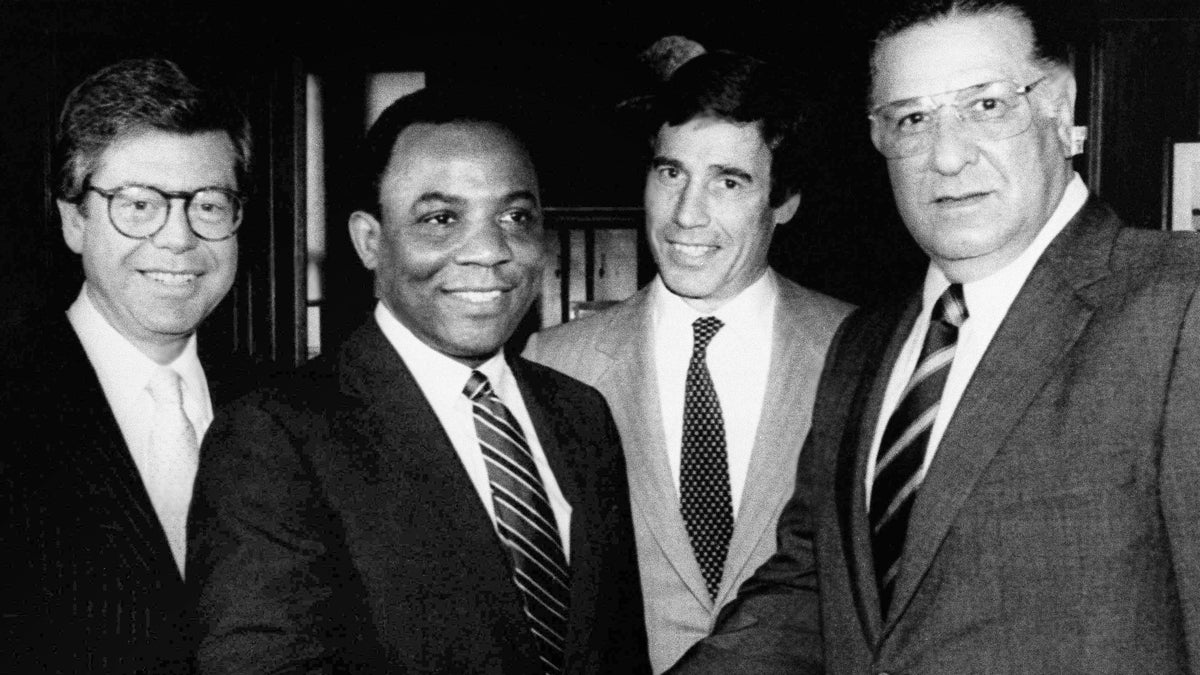PGW: Run, and ruined, by politicans?
Listen
W. Wilson Goode and Frank Rizzo (foreground) are shown shaking hands in the midst of Philadelphia's 1983 Democratic mayoral primary race. After losing, Rizzo put his support behind Goode, a move that Republican mayoral candidate John Egan said led to a lucrative position for Rizzo at Philadelphia Gas Works. (AP Photo/Cliff Hence, file)
As Philadelphians consider whether the city should sell the municipally owned Philadelphia Gas Works, one issue in the debate will be whether the utility has been badly managed because politicians have run the place. It’s an interesting question, and there’s evidence for both sides in the company’s troubled history.
I was there in 1983 when John Egan, the Republican candidate for mayor, summoned reporters to say he’d heard that the legendary former Mayor Frank Rizzo would be rewarded for endorsing Democratic candidate Wilson Goode Sr. with a job at the Philadelphia Gas Works.
Egan recalled the episode in a phone call, and remembered that he couldn’t prove it, and couldn’t tell reporters where he’d heard it.
“You know, there was obviously skepticism from the press,” Egan said. But sure enough, after the election Rizzo became a well-paid security chief at PGW, and brought some of his old associates onto the payroll as well.
A long history
Two years after that, the Philadelphia Daily News reported that PGW was keeping a VIP list of politically connected Philadelphians for special treatment, including a no shut-off policy and sometimes reductions on their bills. A federal investigation ended without charges, but it was another embarrassment for the gas works.
In the 1990s, things got worse. A new management team so generously helped themselves to company perks and goodies that four executives faced criminal charges. Two pleaded guilty and two were acquitted at trial. They included former CEO James Hawes who was fined $22,000 and condemned by the state Ethics Commission.
I spoke to current PGW CEO Craig White at the news conference announcing the sale. He became chief operating officer of the utility after the departure of the Hawes team, and he said the company was terribly managed then.
“We weren’t billing 50,000 customers — they weren’t even getting a bill,” White said. “We weren’t showing up for appointments, and we couldn’t even answer the phone for 45 minutes to an hour.”
Sam Katz, who’s spent much of his career as an analyst of city finances and is now producing a video history of the city, said political influence over PGW goes back to the late 19th century, when Republicans were in charge.
“PGW has a 120-year history of being a political football, of being a vehicle for political patronage, and being a source and cause of a lot of angst among its customers,” Katz said.
Better off now
But if political appointees made a mess of PGW, it must be noted that it was a management team appointed in 2000 by another politician, then Mayor John Street, that truly turned the company around.
Street tapped Thomas Knudsen, who’d spent years as a financial expert for consumer advocates battling PGW, to run the utility. There’s a wide consensus that the utility is far better managed today.
Mayor Michael Nutter said at the Monday news conference announcing the sale that it no longer makes sense for the city to own a gas utility.
When I asked whether political influence was PGW’s fatal flaw, Mayor Nutter said, no, he didn’t see it that way. For a variety of business reasons, including the fact that PGW is limited to Philadelphia’s customer base, he said, a privately owned utility is better suited to the challenges of today’s energy world.
And, he said, consider the company’s turnaround. “The company is more valuable today that it’s probably been in 30 years,” he said. “The collections are at the highest level they’ve been. They’ve brought in operational efficiencies.”
All true. On the other hand, if Nutter did think political influence was a big problem for PGW, I wouldn’t expect him to trumpet that to the 17 politicians on City Council who’ll decide whether the sale goes through.
WHYY is your source for fact-based, in-depth journalism and information. As a nonprofit organization, we rely on financial support from readers like you. Please give today.


